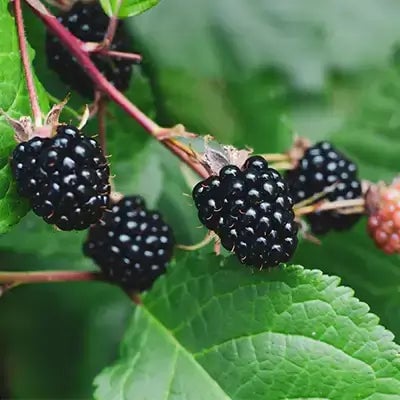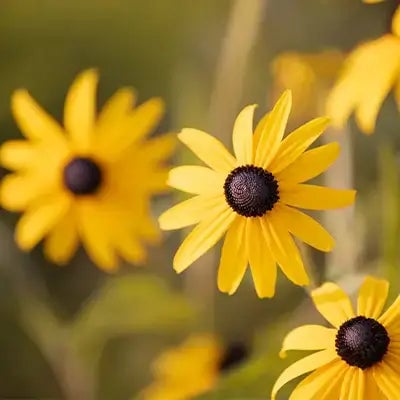The Beauty and Benefits of Growing Black-Eyed Susans
Gardening enthusiasts and nature lovers often find themselves captivated by the enchanting beauty of the Black Eyed Susan (Rudbeckia hirta). This cheerful and vibrant wildflower, native to North America, has garnered a special place in gardens, landscapes, and hearts across the continent. Its distinctive appearance, ease of cultivation, and numerous ecological benefits make it a standout choice for both experienced gardeners and beginners. This exploration delves into the multifaceted charm and advantages of growing Black-Eyed Susans.
A Captivating Beauty
Black Eyed Susans are renowned for their stunning visual appeal, making them a delightful addition to any garden or natural area. These wildflowers feature golden-yellow petals surrounding a dark brown or black central cone, resembling a sunburst that radiates positivity and warmth. Their daisy-like appearance adds a touch of classic charm to gardens, while their vibrant color palette infuses a lively energy into outdoor spaces.
One of the notable aspects of Black Eyed Susans is their adaptability to various settings. They could thrive in a wide range of soil types, including well-draining and even less fertile soils, which makes them a valuable asset for landscaping projects and gardens with diverse growing conditions. These versatile flowers can be incorporated into traditional cottage gardens, modern landscapes, wildflower meadows, or even containers, adding versatility to their visual impact.
Ease of Cultivation
One of the reasons Black Eyed Susans have gained such popularity is their ease of cultivation. Whether you're an experienced gardener or only starting, these hardy wildflowers can flourish with relatively minimal care. They are well-suited for beginners seeking to establish a beautiful garden without excessive maintenance.
Black Eyed Susans are perennials, which means they will return year after year with the proper care. They are generally planted in the spring or fall, and once established, they require little more than occasional watering during dry periods. These flowers have a deep root system that allows them to tolerate drought once they've matured.
Additionally, Black Eyed Susans are known for their resistance to various pests and diseases, making them a low-maintenance option compared to other garden plants. Their ability to attract beneficial insects like bees and butterflies further contributes to a balanced garden ecosystem.
Ecological Benefits
Beyond their aesthetic appeal and ease of care, Black Eyed Susans offer a range of ecological benefits that make them a valuable addition to residential gardens and larger natural areas. These benefits include:
- Pollinator Magnet: Black Eyed Susans are a pollinator's paradise. Their bright yellow petals and nectar-rich centers attract a wide diversity of pollinators, including bees, butterflies, and even hummingbirds. Supporting pollinators in your garden is crucial for ecosystem health and food production.
- Wildlife Habitat: The dense growth of Black Eyed Susans provides cover and nesting sites for small animals, birds, and insects. These flowers contribute to the biodiversity of your garden by offering a habitat for beneficial creatures.
- Soil Erosion Control: The extensive root system of Black Eyed Susans helps stabilize soil, preventing erosion. This makes them an excellent choice for planting on slopes, in areas prone to decay, or near water bodies.
- Naturalization: Black Eyed Susans can be used to create beautiful and sustainable wildflower meadows. Their ability to self-sow and establish colonies makes them an ideal candidate for naturalization projects, contributing to the restoration of native plant communities.
Cultural Symbolism
In addition to their practical benefits, Black Eyed Susans also carry cultural symbolism. They are often associated with positive traits like encouragement, motivation, and protection. In some Native American traditions, these flowers were believed to have healing properties, adding to their cultural significance.
Cultivation Tips
For those inspired to embrace the beauty and benefits of growing Black-Eyed Susans, a few cultivation tips can ensure a thriving garden:
Site Selection: Choose a location that receives at least six hours of sunlight daily. While Black Eyed Susans can tolerate partial shade, they will produce more flowers in full sun.
Soil Preparation: Prepare the ground by loosening it and adding organic matter like compost. Well-draining soil will help prevent issues with root rot.
Planting: Plant Black Eyed Susans in the spring or fall, spacing them about 18 to 24 inches apart. Water them well after planting to help establish their root systems.
Watering
While Black Eyed Susans are drought-tolerant once established, regular watering during the first growing season will aid in root development.
Deadheading: To encourage continuous blooming, consider deadheading (removing spent flowers) regularly.
Division: Consider dividing the plants every few years to maintain their vigor and prevent overcrowding.
Pest Control: While these plants are relatively pest-resistant, keep an eye out for any issues and address them promptly if they arise.
Conclusion
In gardening, few flowers embody the spirit of nature's beauty and resilience as magnificently as the Black Eyed Susan. From their vibrant appearance and ease of cultivation to their ecological benefits and cultural symbolism, these wildflowers have captured the hearts of gardeners and enthusiasts across the continent. By planting Black Eyed Susans, you're enhancing the visual appeal of your outdoor space, contributing to a healthier ecosystem, and embracing the timeless wonder of nature's creations. So, whether you're looking to add a touch of golden radiance to your garden or embark on a journey of ecological stewardship, Black Eyed Susans are a choice that will undoubtedly leave a lasting impact.
Read more

The black raspberry is in the Rubus category, listed as the Rubus Occidentalis. This berry grows on a small shrub in various climates. This fruit is native to the eastern part of North America, whe...

The black raspberry is in the Rubus category, listed as the Rubus Occidentalis. This berry grows on a small shrub in various climates. This fruit is native to the eastern part of North America, whe...


